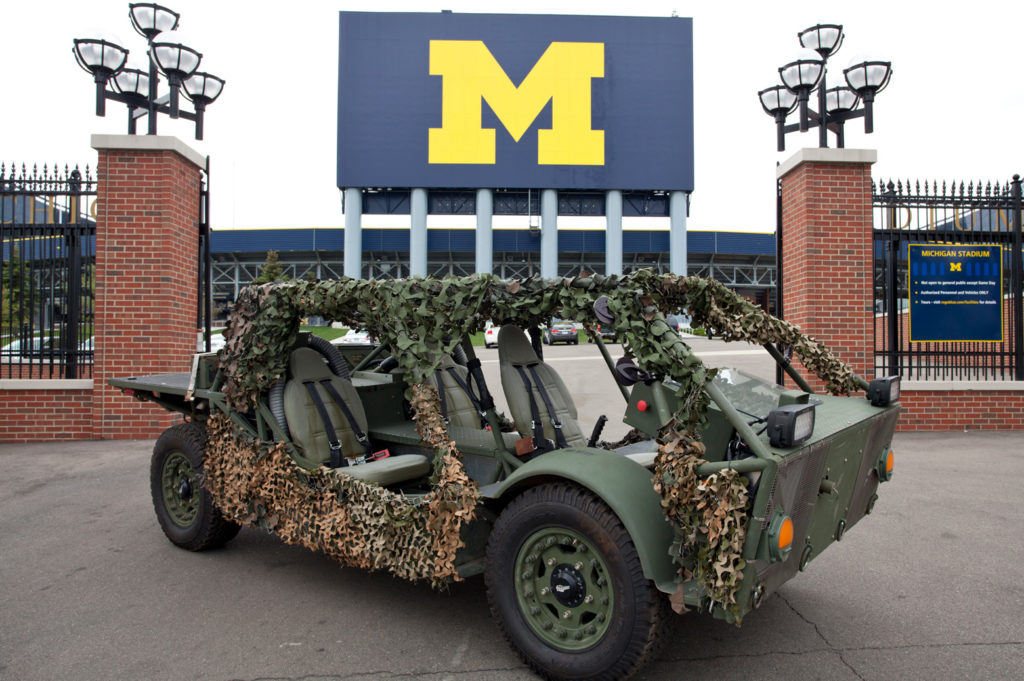
With a record 330 attendees from government, industry and academia, the University of Michigan’s Automotive Research Center (ARC) recently held its 27th annual review virtually. The event shines a light on the impactful research done by the center and showcases how that research can be applied to solve real-world problems for the nation, state of Michigan and industry.
“There is really no question that this (ARC) is a national strategic asset,” said U.S. Sen. Gary Peters, of Michigan.
Peters drew attention to the leadership of the entire region, mentioning the Ground Vehicle Systems Center in Warren, world-class universities including U-M, and “the fact that we’re in the center of civilian R&D for automation.”
“Michigan is at the heart of where the future will come forward,” he said. “You all are at the forefront of what I think is perhaps the most exciting time in human history to be alive. The technological advancements coming forward right now or on the horizon will transform society in ways we can’t fully imagine, and the work you’re doing will clearly make a difference.”
Since its launch in 1994, the ARC has continually served as a source of technology, modeling and simulation for the Army’s fleet of vehicles – the largest in the world. In 2019 the center was the recipient of a $50 million contract from the US Army and pivoted its focus to autonomous technologies for military ground vehicles. This funding extends the center’s partnership with the Army through 2024.
“For more than 25 years, the University of Michigan has been the proud home of the ARC,” said Alec D. Gallimore, the Robert J. Vlasic Dean of Engineering, the Richard F. and Eleanor A. Towner Professor, an Arthur F. Thurnau Professor, and a professor of aerospace engineering.
“The ARC has been, and continues to be, an engine of fundamental research discovery, a driver of autonomy applications, a leader in strengthening the US Army’s modeling and simulation capabilities, and a facilitator of outstanding government, industry, academic partnerships. ARC’s excellent work improves operations in both structured and unstructured environments, including off-road in rural areas and in emergency disaster relief situations. Fundamentally this work helps to keep soldiers safer.”
At the event on May 10 and 11, researchers presented case studies and technical presentations that addressed key engineering steps necessary to develop and deploy future autonomous and ground vehicles.
One of the case studies focused on constructing a unique framework to train a mixed team of humans and autonomous agents to reliably perform tasks in uncertain environments. The other brought two ARC projects together to integrate real-time physics-based simulation of autonomous ground vehicles with high-level mission planning algorithms.
“The projects that you’re working on, the gaps that you’re satisfying in terms of providing enabling capabilities to inform us of where we need to invest, what’s the roadmap of product development look like to achieve our next-gen combat vehicle—it is just amazing the alignment we have,” said Michael Cadieux, director for the U.S. Army Combat Capabilities Development Command’s Ground Vehicle Systems Center.
The ARC review also included a number of keynote addresses. Tony Bromwell, the vice president for engineering operations at MSC Software, inspired attendees with a talk that closed with an emphasis on the importance of partnerships and collaborations, like those of the ARC.
“The more we work as a team, sharing information, the faster we will solve the challenges ahead of us,” said Bromwell.
Partnerships between academia, government and industry are extremely important for simulating technological breakthroughs and facilitating work across organizational boundaries and silos. Such partnerships promote social justice by enhancing social mobility and by promoting diversity, equity and inclusion in workforce development. The ARC is a leader in this partnership and workforce development effort in the automotive sector in Michigan as well as across the country.
The work of the ARC has also impacted civilian autonomous vehicles, said Bogdan Epureanu, ARC director and Arthur F. Thurnau Professor in the Department of Mechanical Engineering at U-M.
“Our strategic partnerships stimulate technological breakthroughs in the development of modern autonomous transportation systems,” Epureanu said.
